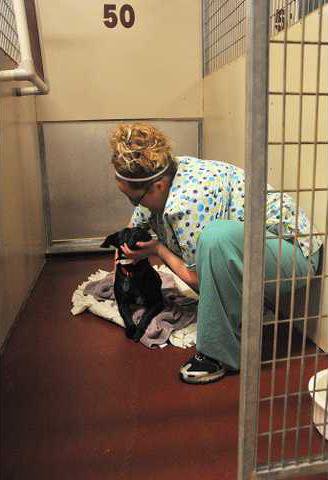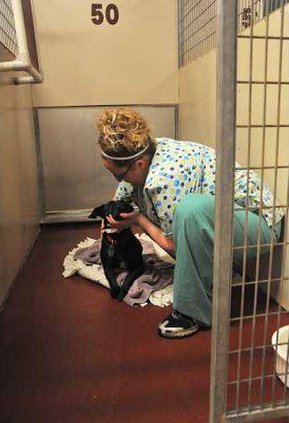It wasn’t the best day for little Cabo, but Thursday was certainly a proud moment for the Humane Society of Northeast Georgia.
The shelter performed its 25,000th spay-neuter surgery on Cabo, a male Papillon dog from Gwinnett County.
President Rick Aiken said the milestone marks the Humane Society’s efforts to decrease the stray pet population in Northeast Georgia.
“There’s just too many dogs and cats out there, there’s not enough homes,” Aiken said. “(The surgeries) saved a tremendous amount of animals from being euthanized.”
Since separating from Hall County in October 2009, the Humane Society has expanded its spay-neuter clinic, which it started in 2005.
Aiken said they have also focused on advertising the clinic in nearby rural counties that don’t have such services.
In the beginning, the clinic served only low-income residents’ pets, while performing surgery for the shelter’s adopted animals. Two years ago, the clinic began performing surgeries for others as well.
Currently, the clinic offers surgeries at $60 for female dogs, female cats and male dogs, and $50 for male cats. Animals must be at least 2 pounds and/or 8 weeks old to have surgery. The vet at the Humane Society is able to perform between 30 and 35 surgeries a day, Aiken said.
The Humane Society recommends the surgery for all dogs and cats.
“It’s just so much better for your pet,” Aiken said. “Unless you are a licensed breeder by the department of agriculture, there’s no reason to have an animal that is not spayed or neutered.”
Mike Ledford, Hall County’s Animal Control director, said the spring and summer months are especially busy.
“We’re seeing a huge spike in the number of kittens and cats brought in to us,” Ledford said. “Folks are finding them everywhere.”
Ledford said because of the breeding cycle of cats, the Hall County Animal Shelter is now taking in about 40 percent more cats and kittens than it did in the winter months.
The intake of dogs and puppies has stayed relatively steady, he said.
“We’re doing as much as we can to get as many out of here as we can,” Ledford said. “We’re seeing a more steady flow of people
looking to adopt. It’s increased every month.”
Since the Humane Society split from animal control, it has become a selective-admission shelter.
Though his organization no longer has to euthanize animals, Aiken said he hopes its spay and neuter program will reduce the amount of pets the animal shelter has to put down each year.
“Spaying and neutering is so much nicer than euthanasia,” Aiken said. “Because people do not spay and neuter, that has to be done.”

